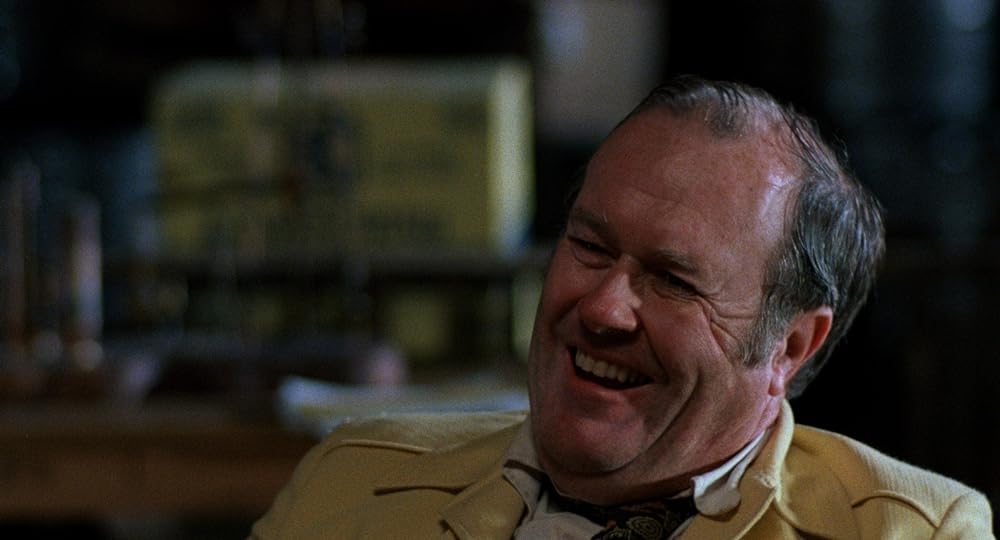Harrison Ford walks through Union Station, doubling as police headquarters, as the camera comes to meet him, disappearing behind a dusty, trash covered roof, and then finding him at the open door to a man’s office. Ford’s been picked up on some important errand, the kind that interrupted his lunch in the teeming Chinatown eatery he frequents. A man like this isn’t easily intimidated but he knows something’s up or he wouldn’t have broken his lunch date with himself to see to it. Just who does he owe such tormented allegiance? Who’s waiting for him at the end of this cab ride? He’s pressed into a shirt that’s been washed both too much and too little, his mustache seems uneven in the heavy shadows, and his eyes are sunk into his face so differently your brain conjures Picasso’s hand at a canvas. They light up in the dark, musty office. His expression changes every time the camera returns to him. He smiles like an infant when he sees Ford, the bright open features parting his five-o-clock shadow like the Red Sea. Ford shoots him a dirty look, which prompts this: “Don’t be an asshole, Deckard. I’ve got four skin jobs walking the streets.” Suddenly his face is closed, steely and round, an unmarked can of survivalist rations. This man is eating the scene alive and Ford along with him, his voice nagging and echoing like a screen door with a rusty hinge. “I need your magic,” he says. And, like that, “Blade Runner” has properly begun. There is no magic like a performance by M. Emmett Walsh.
Michael Emmett Walsh was born in 1935 in Ogdensburg, NY, a picturesque town that shared a view of the St. Lawrence River with Ottawa, but the family moved to Vermont when he was young, and it was to Vermont he’d return after he’d made his fortune as one of the best film actors in America. It was Vermont where he’d succumb to the heart attack that killed him on Wednesday, the 21st. When he was three years old doctors discovered a problem in his mastoid, the bone right behind his left ear, and in curing it they permanently deafened it. And so the square jawed kid, who looked like he could have flown Apollo missions or led the Buffalo Bills to a Super Bowl win, grew up with a slurred approximation of a Vermonter accent. He had enough of a sense of self to understand he was not about to become the next Laurence Olivier, doing “King Lear” to adoring West End audiences. His only choice was to become himself.
Walsh could have been an athlete or used his degree in Business Administration from Clarkson as a passport into the world of finance, but he was more taken with an extracurricular that was only just beginning to seem like a viable option. He wanted to act and did a number of college productions before his faculty advisor convinced him to go down to New York and see if he had what it took. He enrolled at the American Academy of Dramatic Arts where his roommate was a young William Devane and his pastime was sneaking into plays like the Anne Bancroft production of “The Miracle Worker” at intermission, as he never had any money to see the play from the top. Doggedness and a natural, singular charisma got him his break on Broadway opposite another up-and-comer named Al Pacino. Pacino became a star. M. Emmett Walsh became the actor you get when you need to challenge your star.
His screen credits began in the ignominious way of many of the greats, with bit parts of TV movies and low paying counter-culture films based on counter-culture novels shooting in Lower Manhattan, like John Schlesinger’s beloved “Midnight Cowboy” and Aram Avakian’s “End of the Road”. His first bit of real eccentric film acting came in Arthur Penn’s “Alice’s Restaurant,” based on a song by Woody Guthrie’s son Arlo, who also played the lead character. Walsh has less than a minute of screen time, yet pulls you in with his pinched expression, screaming, incoherent delivery, and natural air of corrupt authority. He plays a drill sergeant, the first time he would hide behind a uniform as he projected pure evil into the world. He does make you want to stand at attention, to guess at the menacing things swimming around in that enormous head.
You see the careers born in his crooked squint, the Philip Seymour Hoffmans, the Danny McBrides, the John Goodmans, the James Gandolfinis, you see the tradition of Golden Age studio stars and character actors alike, from Edward G. Robinson to William Demarest to James Cagney to Broderick Crawford. Walsh’s DNA can be found all over the history of Hollywood, and yet he had an ineffable bluster, a good old boy charm that can freeze into terrifying purpose in the blink of an eye, as it does in his short scene in Blade Runner. Every angle a revelation, every line a new man.
The 70s brought him more TV and more bit parts in counter-culture comedies like the acid western “Kid Blue,” “They Might Be Giants” based on the play by James Goldman, Brian De Palma’s “Get to Know Your Rabbit,” starring Tommy Smothers, and Norman Lear’s “Cold Turkey”. Arthur Penn brought him back for a small part in his own western “Little Big Man,” starring Dustin Hoffman. It’s perhaps more accurate to say that Walsh is the kind of actor who happens to the stars, a human plot point. Walsh himself admitted that the stars don’t deliver exposition, that was his job. And sometimes he simply was exposition, a definition by absence. He was what the hero was supposed to not be.
James Caan wanders up to a bar in Karel Reisz’s “The Gambler” and finds a nervous man with thinning hair, big glasses, and a constant shake. The two have money on the same game and watch the result on TV together. Walsh’s gambler is a man unafraid of projecting his desperate, friendless, losing energy into the world. Caan wants to believe himself better than this poor dope, that he’s got his life figured out, but all he’s done is learn how to mask it. The cover up the tics that Walsh so eagerly displays. Would life be so much worse if he were like this man? And yet he can’t ever force himself to be. Would you want to be this man, waiting perpetually in the shimmering purgatory of a Vegas bar to remind people where they are on their arc? To quote a later Walsh character, “My friend, I see you’re gonna force me to deal with you.”
Minor parts in major films piled up; Peter Bogdanovich’s “At Long Last Love” and “Nickelodeon,” Hal Ashby’s “Bound for Glory,” Sidney Lumet’s Serpico, George Roy Hill’s “Slap Shot,” Elaine May’s “Mikey and Nicky,” and Peter Hyams’ “Capricorn One” is a hit rate of which any actor would have been proud. He wasn’t becoming a star, but that was much the better, stars have to prove. He could just have fun, and no one ever seemed like they were having more fun. Look at him as the sadistic parole officer in Ulu Grosbard’s “Straight Time,” based on Eddie Bunker’s book. Once more opposite Dustin Hoffman, he gets to solo while Hoffman has no choice but to hold down the rhythm. Sensing a chance to get one over on Hoffman’s powerless ex-con, the face splits like a knife cut into holiday roast, and the downturned lips dance upwards into a smile like a burlesque performer teasing the audience with the hem of her skirt. He wants so badly to ruin this guy’s day.
Walsh knows he has power, and Hoffman has none. This arrangement is one of a million just like it and he loves that he makes the rules. The trick is the way he makes it apparent that he’s fighting the urge to look as thrilled as he is to torture his charges. The sociopathy is barely covered because in this pocket of the world, with drug addicts and thieves his easy prey, he only needs to pretend a little. When Hoffman finally loses it with Walsh halfway through the movie, you know he’s fallen right into the guy’s trap, though of course there’s a certain brute satisfaction watching him finally get humiliated. The injustice is preordained. What can you do when guys like this make the rules? A perfect performance in a career full of them.
His last film of the 70s made him a cult figure if anything did, when he tries to kill the hapless hero of Steve Martin and Carl Reiner’s film “The Jerk”. The scene of him shooting up Martin’s gas station at random (“He hates those cans!”) would later cause quite a reaction in his “Blade Runner” director Ridley Scott’s “Black Hawk Down”. The scene’s hilarity provokes Ioan Gruffudd’s Lieutenant Beales to have a seizure, which then changes the course of the following day’s mission, resulting in catastrophe. Maybe a backhanded tribute to Walsh, but not an understatement of the transformative power of his best work. Just look at one of his few honest-to-god leading man turns, in Joel and Ethan Coen’s debut feature “Blood Simple”. The film opens with images of a grody, forgotten corner of the South that perfectly matches Walsh’s corroded soul and sweaty features. “Now in Russia, they got it mapped out so that everyone pulls for everyone else … that’s the theory, anyway. But what I know about is Texas, an’ down here … you’re on your own.” Walsh’s unnamed private detective is a human oil stain, a spilt beer in a sun faded suit, that may once have masked his disgusting, predatory nature.
Walsh thought of the part as a modern spin on the kinds of parts Sidney Greenstreet used to play, but Greenstreet was good company, even when playing bastards. You wouldn’t want to be with the detective for the length of an elevator ride. He has the wheezing laugh of a chimpanzee and a demon’s leer, and yet the miraculous thing is you start to suspect that the violence he’s willing to commit is a last resort. He’s somehow not as crazy as he seems, just desperate, greedy, and unlucky. Lying on his back in his yellowing suit, clutching his bleeding gut, his piercing blue eyes really registering for the first time; this is the kind of character you needed an actor like Walsh to create. He’s a real guy you could run into and repel from. He won the independent spirit award for best leading performance, the first ever, and the rest of his career was assured.
Walsh would never get another part like the one in “Blood Simple,” but he would make movies his if the directors and/or his co-stars weren’t careful. He walks off with the likes of Joseph Zito’s unforgivable “Red Scorpion” and manages to fully project his personality into a voice role in the classic animated fable “The Iron Giant”. Parts in high-and-low-profile films alike kept him busy enough to rack up hundreds of film and television credits. He played cops and judges and functionaries and uncles in films like Hyams’ “Narrow Margin,” Alan Rudolph’s “Equinox,” Charles Burnett’s “The Glass Shield,” and Joel Schumacher’s “A Time to Kill”. “They weren’t all Hamlet,” Walsh later confessed. Even die-hard fans like Roger Ebert, who coined the famous Stanton-Walsh Rule, currently being cited in every obituary of the towering actor, which states that no film with either Walsh or Harry Dean Stanton can be all bad, had to admit he strayed from time to time. Specifically in Wild Wild West, directed by his Blood Simple cinematographer Barry Sonnenfeld, a film and performance best forgotten, if it were possible to do so. Similarly no one rushed to turn in anniversary pieces for the likes of “Snow Dogs” or “Chairman of the Board,” despite defensible work from the actor in them.
As he aged his welcome, oblong presence seemed less like good casting and more like a family reunion. Brief supporting turns in “The Odd Life of Timothy Green,” “Calvary,” and “Knives Out” weren’t challenging for the actor or his audience. It was nice to see him enjoying his reputation and the easy work, not that he ever phoned anything in. It was a gentle refutation of what he said in an interview with Criterion in the special features for their release of “Blood Simple”: “When I come on screen you don’t see Emmett Walsh, you see whatever he’s supposed to be playing…that can’t be taught. 80% of acting can more or less be taught. The other 20% that’s the gift.” M. Emmett Walsh’s stature, voice, unconventional looks, and his chops in front of a camera were a gift. What he did with them? That was his magic.












